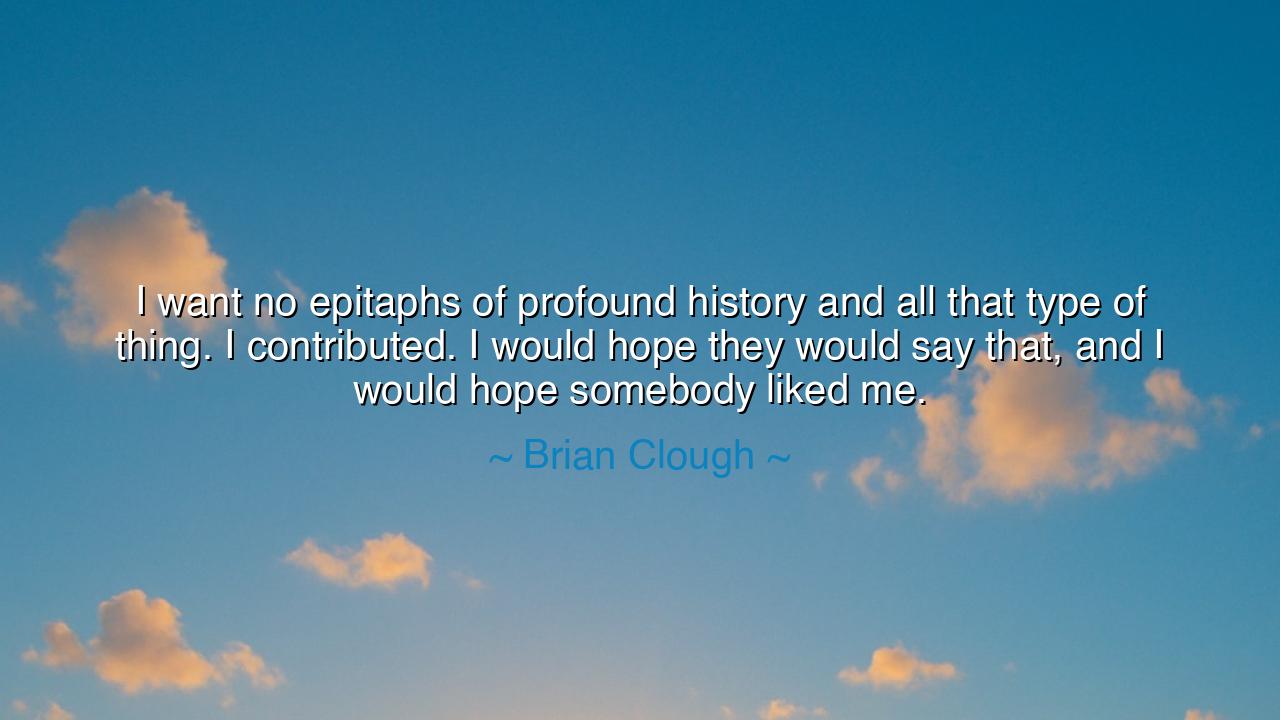
I want no epitaphs of profound history and all that type of
I want no epitaphs of profound history and all that type of thing. I contributed. I would hope they would say that, and I would hope somebody liked me.






“I want no epitaphs of profound history and all that type of thing. I contributed. I would hope they would say that, and I would hope somebody liked me.” — Thus spoke Brian Clough, a man of great passion and rare humility, whose fire on the field was matched only by his understanding of life’s fleeting glory. His words are not the boast of a conqueror, nor the lament of a defeated man; they are the quiet reflection of one who has seen the heights of triumph and the shadows of time, and has chosen simplicity over spectacle. In this declaration lies a truth as old as the earth itself: that legacy is not written in marble, but in the hearts of those we touch.
Clough, the fiery genius of football, conquered the game not through wealth or noble birth, but through sheer will and vision. He led teams like Derby County and Nottingham Forest from obscurity to greatness, lifting them to championships and European glory. Yet in his later years, when the storms of pride had calmed, he looked back not at trophies, but at people — the players he inspired, the fans he gave hope to, the souls he moved. And so, he uttered this simple truth: it is enough to have contributed. The grandeur of statues and the weight of history fade, but kindness and purpose endure.
In the olden days, men sought to carve their names into stone, believing immortality could be won by inscription. Pharaohs raised pyramids, emperors built temples, generals had their deeds sung in battle hymns. Yet all those monuments crumble, and all those songs fade to whispers. The wise knew this — Marcus Aurelius, emperor and philosopher, wrote that even the mightiest rulers would soon be dust, remembered only by the dust that followed them. What remains, he said, is not fame, but virtue — the quiet goodness of one’s actions. So too did Clough speak in that ancient spirit, shunning the epitaph of profound history, choosing instead the humble remembrance of one who gave his best.
To say “I contributed” is an act of wisdom. It is to accept one’s place in the grand mosaic of life — not as the center, but as a piece that adds color and meaning. It is a rejection of vanity, a bow before the truth that none of us create greatness alone. The coach contributes to the player, the player to the team, the team to the crowd, and the crowd to the spirit of the game. Each act, though small, shapes the world. When we understand this, we no longer hunger for statues; we hunger for significance — not to be remembered forever, but to have mattered now.
And in those last words — “I would hope somebody liked me” — there is no weakness, only deep humanity. For what greater victory is there than to have been loved, even by a few? Empires fall, records are broken, and history forgets, but affection — that quiet, enduring warmth — is eternal. Many have been feared, many admired, but only a few have been truly liked — for to be liked is to have been kind, to have shared laughter, to have been human among humans. It is the most unpretentious, and yet the most profound, of legacies.
Think of Socrates, who left no writings, yet changed the world through conversation — through connection. He did not seek to be worshiped, only to awaken minds. His students carried his words across generations, not because he demanded remembrance, but because he contributed truth to their lives. The power of contribution is not measured in the monuments built, but in the ripples that never stop moving outward.
So, my listener, learn from Clough’s humility. Do not chase the echo of history’s applause; it fades too quickly. Instead, strive to contribute — to your craft, your people, your world. Give of yourself with honesty and courage. And do not fear the simplicity of kindness, for to be liked — truly and sincerely — is to have lived a life that mattered.
When your own days draw to their sunset, may you ask not for grand words upon your tomb, but for simple truth: I contributed. I was loved. Let that be your epitaph, not carved in stone, but written in the hearts of those who walk after you. For that, as Clough knew, is immortality enough.






AAdministratorAdministrator
Welcome, honored guests. Please leave a comment, we will respond soon